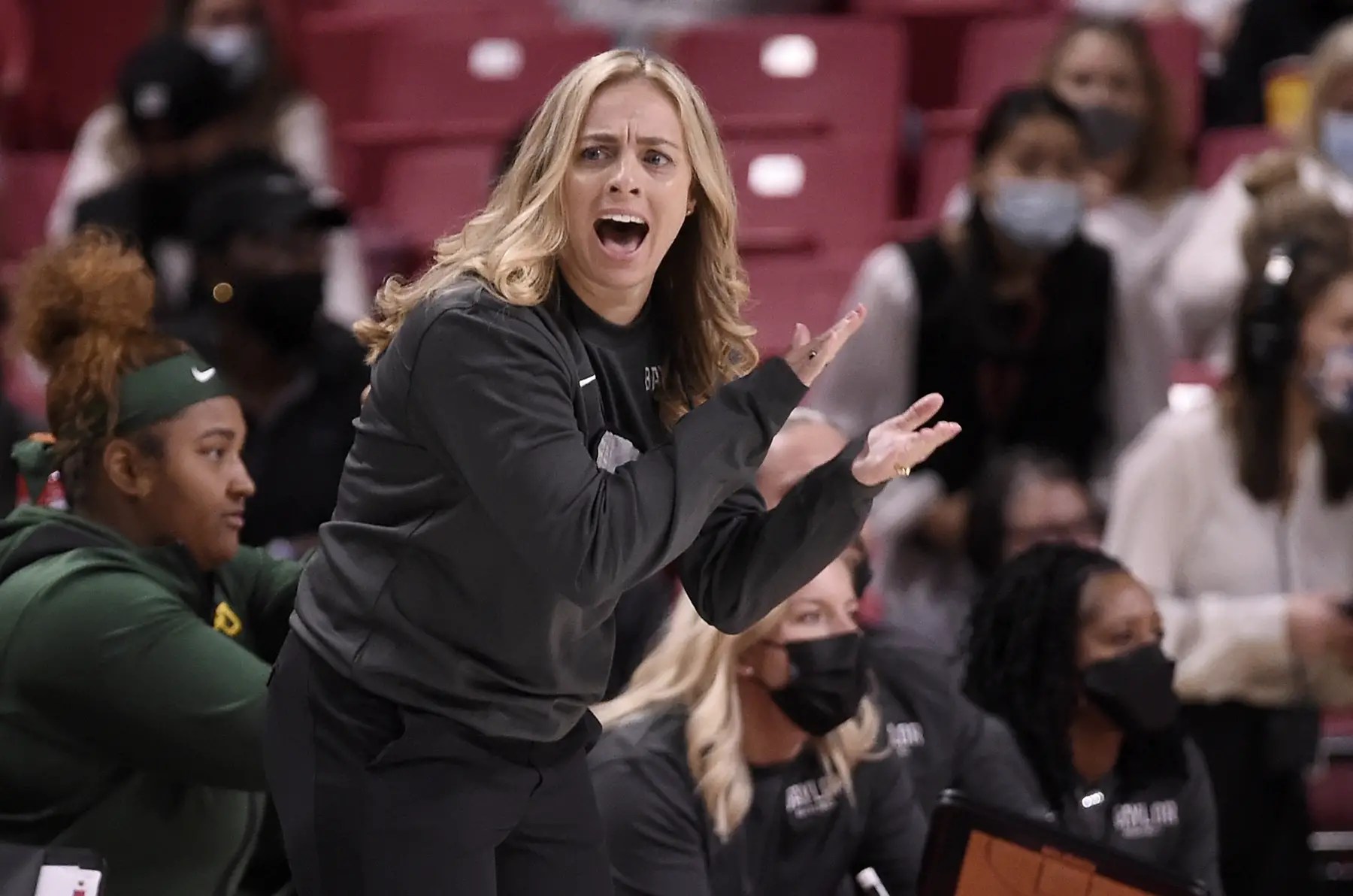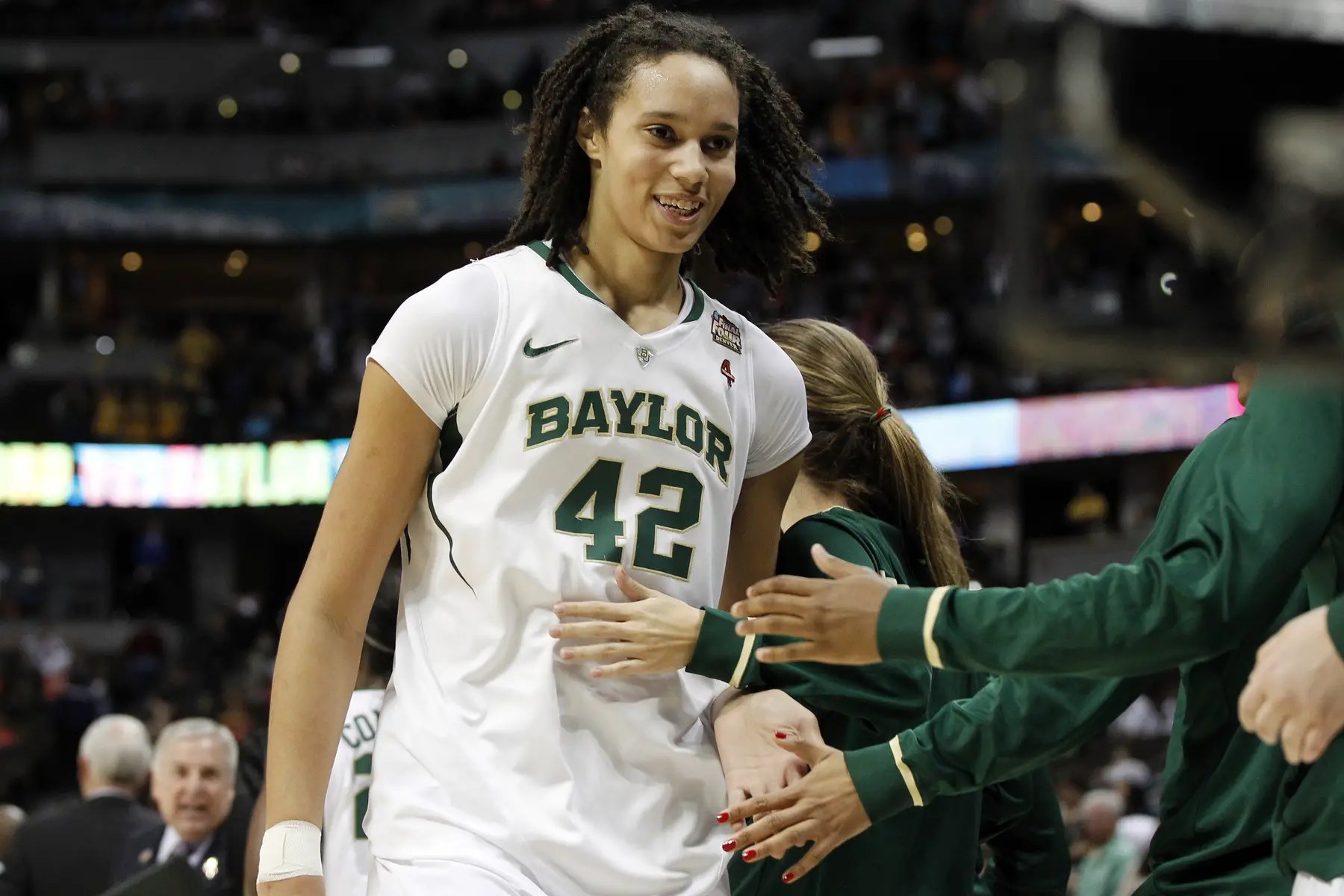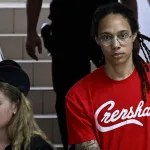When basketball star Brittney Griner left Baylor University in 2013, she was one of the most decorated student-athletes in the school’s history, with accolades that included NCAA Division I Defensive Player of the Year and NCAA Final Four Most Outstanding Player.
But Griner had a complicated relationship with her Baptist alma mater. In her 2014 memoir, she wrote about how the school’s policies against homosexuality kept her from publicly talking about her identity as a queer woman. She also had a strained relationship with Baylor’s then-head women’s basketball coach Kim Mulkey, who left the university in 2021 to coach for Louisiana State University. Griner said she shared her identity with Mulkey during the recruiting process, and Mulkey expected her to keep quiet about it.
Now, 11 years later, Baylor will honor Griner’s legacy by retiring jersey number 42 during a pregame ceremony on campus in Waco, Texas, on Sunday. This is thanks in large part to the support of Baylor’s current women’s basketball coach Nicki Collen. Retiring an athlete’s jersey is one of the highest honors a team can give to a former player, and it is reserved for the most accomplished athletes. Griner will be the seventh Baylor women’s basketball player to have their jersey retired.
“I’m honored to return home to Baylor and celebrate where so much of my journey started,” Griner said in a statement. “I’m grateful to Coach Nicki [Collen] and the entire Baylor community and looking forward to the opportunity to be back on campus, spend time with the team and have my family beside me to share in this incredible moment. Sic ‘Em Bears.”
The recognition is a bright spot for Griner following a difficult two years. On February 17, 2022, Griner was arrested and detained in Russia for 10 months after authorities allegedly found vape canisters with cannabis oil in her luggage.
Her detention sparked public outrage in the United States, and many feared how Griner would be treated in Russia as a Black queer woman. President Joe Biden’s administration successfully negotiated her release in December 2022.
During those months, Baylor and Mulkey said little on Griner’s detention. Both faced criticism for their silence.
Greg Garrett, a Baylor professor, was among those voices, pointing out in a November 2022 column that “Baylor folks should have been leading the charge to raise awareness about Brittney’s wrongful imprisonment.” However, he noted, only Collen had shown public support.
In his column, the professor noted some of the more difficult aspects of Griner’s time playing for Baylor, including Mulkey’s insistence that she be discreet about being a lesbian out of concern that queer visibility would affect the school’s recruiting efforts. “I am well aware that Baylor faces tremendous pressure from all sides as Baptists seek to navigate LGBTQ issues and the status of gay and trans Christians,” Garrett wrote. He added that regardless of the Baylor community’s personal beliefs about LGBTQ+ people, Christians should demonstrate their faith through their actions.
During Griner’s detention, Collen — who never coached Griner — made multiple supportive statements on social media and in interviews, calling Griner’s crisis “a human rights issue.” She has also called for Griner’s jersey to be retired since joining as head coach for Baylor three years ago.

“We’re excited to have Brittney back on campus and honor her with the retirement of her jersey,” Collen said in a statement. “She is one of the best basketball players in Baylor’s history and we’re thrilled that the time has come to celebrate Brittney and all of her accomplishments.”
In response to the news of Griner’s jersey retirement, Mulkey, Griner’s former coach, told reporters, “That’s awesome. I bet it’ll be a great environment.”
Baylor’s record on LGBTQ+ issues has been criticized internally and externally for years.
After leaving Baylor, Griner began publicly acknowledging her sexual orientation. In her 2014 book, she criticized the school’s willingness to “benefit from the success of their gay athletes. That is, as long as those gay athletes don’t talk about being gay.”
Among the challenges at Baylor are the school’s restrictions on LGBTQ+ student groups, said Anna Baeth, director of research for Athlete Ally, an organization that provides research and education about the experiences of LGBTQ+ athletes.
During the years Griner attended, the university’s sexual misconduct policy listed “homosexual acts” — among other behaviors — as “misuses of God’s gifts.”
In the years following Griner’s public statements on Baylor, more LGBTQ+ athletes, students and advocacy groups collectively spoke out on school policies around the country, leading to notable progress, said Nicole Melton, department chair at the Mark H. McCormack Department of Sport Management at the University of Massachusetts, Amherst.
In 2019, for example, a group of former athletes and sports professionals from around the country created The Inclusion Playbook tailored to address racial justice, gender equity and LGBTQ+ inclusion. In 2022 — nearly 20 years after queer students held their first rally near Baylor’s campus — the university granted its first charter to an LGBTQ+ student group.
Baeth noted that Baylor remains very “religiously strict” when it comes to LGBTQ+ students. Athlete Ally gave Baylor University a score of -45 out of a possible 100 points on its 2018 Athletic Equality Index. Last year the U.S. Department of Education affirmed Baylor’s right to religious exemptions from certain federal Title IX protections for LGBTQ students.
Its official stance on sexual orientation currently states that marriage between a man and a woman is “the biblical norm.” It adds that the university does not tolerate harassment or discrimination against LGBTQ+ students and that students cannot face punishment for identifying as queer.
Honoring Griner is a “really fascinating juxtaposition of all of these factors,” Baeth said. “I do think it’s certainly within the purview of the women’s basketball coach, and I applaud that. But I think it’s curious that there has been a tightening of LGBTQ restrictions at Baylor.”
Sharyl West Loeung, who worked as a senior coordinator for outreach and inclusion at Baylor from 2014 to 2022, told The 19th that the political climate surrounding LGBTQ+ issues is “gray,” but there is “a groundswell of faculty and staff who’ve done their best” to improve inclusivity.
Loeung, who helped to organize a celebration in Waco of Griner’s release from Russia, applauded Collen’s consistent support and advocacy for Griner.
“From what I’ve seen at Baylor and other places, when you have a coach or a leader who is choosing the kind, compassionate, inclusive model of leadership that brings people together, it does something far more positive for a community than the more exclusive mindset,” Loeung said.
Correction: An earlier version of this article misstated what policies kept Brittney Griner from talking about her identity as a queer woman. The policies were about homosexuality.







